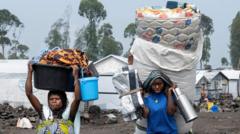With fighting intensifying in the eastern regions of the country, President Felix Tshisekedi has made a swift return from the World Economic Forum in Davos to address a critical humanitarian and security crisis at home. The violence has surged dramatically since the onset of the year as M23 rebels, reportedly backed by Rwanda, have seized control of significant territories, leading to a devastating wave of displacement and casualties.
According to the United Nations, over 400,000 people have been forced to flee their homes as M23 approaches the provincial capital of Goma, which is home to more than a million residents and lies close to the Rwandan border. With the rebels capturing key towns such as Masisi, Minova, and Sake in North Kivu, the situation has reached alarming levels. Local leaders have reported that more than 200 civilians have lost their lives in the territories now held by the insurgents, and airstrikes have tragically affected camps for displaced individuals, resulting in the death of two children.
The impending fall of Goma would represent a critical victory for the M23, which has previously captured the city in 2012 but retreated following a peace agreement. Today, roads leading into Goma have been blocked, raising concerns about food shortages, while locals express fears of safety and survival. Notable voices, such as local union leader Bahala Shamavu Innocent, underline the desperate condition of Goma's residents, stating, “the town is suffocated; there are no more entrances or exits.”
Opposition member Espoir Ngalukiye also voiced deep concerns regarding the immediate safety of Goma's inhabitants, highlighting the pervasive atmosphere of fear. The Congolese army claims to have thwarted an M23 advance on Sake, approximately 20 kilometers from Goma; however, thousands of families in Sake and the surrounding areas have begun to flee, often with little more than the essentials for survival.
As hospitals grapple with a surge of injured civilians, concerns mount over Rwanda's alleged support for the M23. Although the Rwandan government has not confirmed nor denied these allegations, the DR Congo and the UN have both directed accusations towards them.
In light of escalating tensions, UN Secretary-General Antonio Guterres has cautioned that the situation could lead to a broader regional conflict. Guterres has called for respect for the sovereignty of the DR Congo and an end to external support for armed groups, urging immediate action from all involved parties.
This crisis unfolds as the international community watches closely, weighing humanitarian impacts against geopolitical complexities in the region. As the situation evolves, the focus remains on the safety and security of the Congolese people amidst escalating violence and strained resources.
According to the United Nations, over 400,000 people have been forced to flee their homes as M23 approaches the provincial capital of Goma, which is home to more than a million residents and lies close to the Rwandan border. With the rebels capturing key towns such as Masisi, Minova, and Sake in North Kivu, the situation has reached alarming levels. Local leaders have reported that more than 200 civilians have lost their lives in the territories now held by the insurgents, and airstrikes have tragically affected camps for displaced individuals, resulting in the death of two children.
The impending fall of Goma would represent a critical victory for the M23, which has previously captured the city in 2012 but retreated following a peace agreement. Today, roads leading into Goma have been blocked, raising concerns about food shortages, while locals express fears of safety and survival. Notable voices, such as local union leader Bahala Shamavu Innocent, underline the desperate condition of Goma's residents, stating, “the town is suffocated; there are no more entrances or exits.”
Opposition member Espoir Ngalukiye also voiced deep concerns regarding the immediate safety of Goma's inhabitants, highlighting the pervasive atmosphere of fear. The Congolese army claims to have thwarted an M23 advance on Sake, approximately 20 kilometers from Goma; however, thousands of families in Sake and the surrounding areas have begun to flee, often with little more than the essentials for survival.
As hospitals grapple with a surge of injured civilians, concerns mount over Rwanda's alleged support for the M23. Although the Rwandan government has not confirmed nor denied these allegations, the DR Congo and the UN have both directed accusations towards them.
In light of escalating tensions, UN Secretary-General Antonio Guterres has cautioned that the situation could lead to a broader regional conflict. Guterres has called for respect for the sovereignty of the DR Congo and an end to external support for armed groups, urging immediate action from all involved parties.
This crisis unfolds as the international community watches closely, weighing humanitarian impacts against geopolitical complexities in the region. As the situation evolves, the focus remains on the safety and security of the Congolese people amidst escalating violence and strained resources.





















